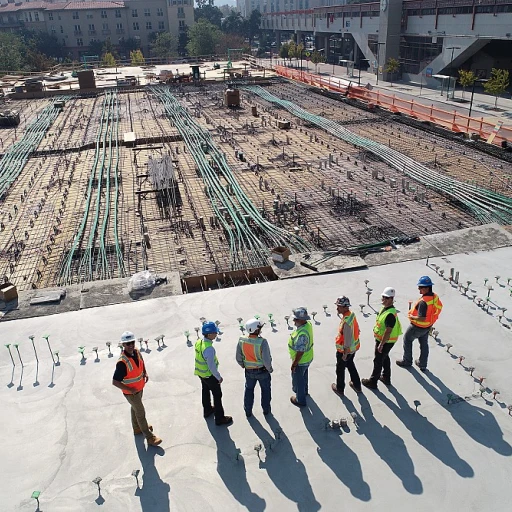Understanding the Recruitment Process
Grasping the Essentials of Recruitment
Embarking on a career in recruitment involves understanding the intricate process that companies use to attract and select the best talent. As a recruitment professional, your role is pivotal in shaping the workforce of an organization. But what exactly does the recruitment process entail?
Recruitment is not just about filling vacancies. It’s a strategic function that requires a deep understanding of the job market, the needs of the organization, and the aspirations of potential candidates. Here’s a breakdown of the key stages:
- Identifying the Need: It all starts with recognizing a gap in the workforce. This could be due to expansion, turnover, or the need for new skills.
- Creating Job Descriptions: Crafting a clear and appealing job description is crucial. It should accurately reflect the responsibilities and qualifications required for the role.
- Sourcing Candidates: This involves using various channels such as job boards, social media, and networking to find potential candidates. Understanding how to leverage social media effectively is a skill you’ll want to master.
- Screening and Interviewing: Once you have a pool of candidates, the next step is to evaluate their fit for the role through interviews and assessments. This is where your ability to ask the right questions and assess answers becomes invaluable.
- Making the Offer: After selecting the ideal candidate, the final step is to extend an offer and negotiate terms that are agreeable to both parties.
To excel in HR interviews for recruitment roles, it's essential to have a comprehensive understanding of each stage of the recruitment process. This knowledge will not only help you perform effectively in your role but also impress hiring managers during your interview. For further insights and tips on interviewing for recruitment specialist roles, visit interviewing for recruitment specialist roles.
Common Interview Questions and How to Tackle Them
Navigating Typical Interview Scenarios
In the world of recruitment roles, interviews can be a multifaceted experience. It's not uncommon to encounter a wide range of questions aimed at assessing not just your professional background, but also your problem-solving skills, interpersonal abilities, and cultural fit. Understanding these questions and how best to tackle them is a crucial step to ensure success.
Behavioral Questions
Behavioral questions are designed to predict future performance based on past behavior. They often begin with "Tell me about a time when..." or "Give an example of..." To tackle these, use the STAR technique—Situation, Task, Action, Result. For instance, if asked, "Tell me about a time you dealt with a challenging hiring manager," outline the situation, the task at hand, the actions you took, and the results achieved. This approach not only organizes your thoughts but vividly showcases your capabilities.
Technical Knowledge Queries
Recruitment roles often require a detailed understanding of specific tools and technologies. Interviewers might ask about your experience with applicant tracking systems (ATS) or your familiarity with data analytics to screen applicants efficiently. Preparing for such questions involves revisiting the technical tools you've used and perhaps brushing up on current technologies or trends. Having real-life examples that demonstrate your proficiency can distinguish you from other candidates.
Competency-Based Questions
Competency-based questions assess your ability to meet the core skills required for the role. These might include questions on negotiation skills, decision-making, or leadership. An important tip for handling these is to align your answers with the competencies mentioned in the job description. For detailed insights and tips specific to recruitment specialist roles, consider this
in-depth guide.
Understanding the recruitment process and how candidates are evaluated is as crucial as preparing for the interview itself. The role of company culture, relationships with hiring managers, and social media can also influence the hiring decision, and the other parts of this article cover these underlying aspects in detail.
Skills and Experience: What Recruiters Look For
Assessing Top Attributes
When it comes to excelling in HR interviews for recruitment roles, understanding the specific skills and experiences that recruiters prioritize can significantly benefit your preparation. These roles, being pivotal in attracting and selecting outstanding talent, require a particular set of attributes that demonstrate both expertise and potential growth within the field.
First and foremost, recruiters value strong communication skills. This includes both verbal and written communication, which are essential for crafting engaging job descriptions, conducting interviews, and collaborating with hiring managers. Your ability to articulate ideas clearly and persuasively can set you apart from other candidates.
Secondly, organizational skills are paramount. Recruitment processes often involve managing multiple job openings simultaneously, and being able to stay organized ensures that you can efficiently track candidates, schedule interviews, and maintain seamless communication with all stakeholders involved.
Moreover, demonstrate your problem-solving abilities. Recruiters are often faced with challenges such as addressing skill shortages or finding candidates who fit unique company cultures. Highlighting past experiences where you've successfully navigated such challenges can underscore your capability to bring effective solutions to the table.
Additionally, showcasing your knowledge in modern recruitment tools can enhance your appeal. Familiarity with applicant tracking systems (ATS) and data analytics ensures that you can efficiently manage the recruitment pipeline and make data-driven decisions.
For candidates seeking to land a role as an HR Director, focusing on these areas can be particularly crucial. You might want to explore further how to ace interviews for the HR Director role by following strategies that highlight the blend of skills and leadership required for such positions (https://www.hr-job-interviews.com/blog/how-to-ace-interviews-for-the-hr-director-role).
Finally, do not underestimate the value of cross-departmental collaboration. Building strong relationships with hiring managers can not only enhance the recruitment process but also provide a comprehensive understanding of the key qualities required in potential hires, allowing for more targeted and successful recruitment efforts.
The Role of Company Culture in Hiring
Embracing Company Culture
When candidates and interviewers discuss job opportunities, the company's culture often becomes the unspoken element that can make or break a hiring decision. In the field of recruitment, understanding and conveying this culture is crucial as it helps attract talent that resonates with the organization’s ethos, leading to better retention rates and overall job satisfaction.
Culture is not a one-size-fits-all aspect; it varies widely across organizations, industries, and even teams. A recruiter’s effectiveness is enhanced by a deep knowledge of the company’s values, working environment, and motivational factors that draw candidates in. This begins with internal reflection on what the company stands for, its mission, and its vision. Familiarize yourself with the organization's history, achievements, and future goals, as these elements craft a narrative for potential hires.
Highlighting Cultural Fit During Interviews
To effectively assess a candidate's fit, questions should be tailored to uncover their working style, values, and compatibility with the company’s culture. For instance, asking scenario-based questions can reveal how a candidate approaches collaboration, conflict resolution, and project ownership. Integrate storytelling into the interview process by sharing anecdotes that exemplify the company culture to give interviewees a vivid picture of the day-to-day life within the organization.
Proactively addressing aspects of the culture during recruitment not only sets proper expectations but also demonstrates transparency – a valued trait by prospective employees. Facilitating shadow sessions, engaging in team interactions, or offering virtual tours of offices (for remote or geographically diverse candidates) can also provide authentic glimpses into the workplace dynamic.
The Weight of Values in Decision Making
While skills and experience are critical, aligning on values can be equally vital in decision-making processes. An individual whose values align closely with the company’s is more likely to be engaged and motivated, leading to a mutually rewarding relationship. Hence, it’s important for recruiters to delve into what drives a candidate’s decisions, their priorities, and how these align with the company's cultural framework.
By weaving cultural narratives throughout the recruitment process, one can ensure that hires not only bolster the workforce with competency but also enhance the communal atmosphere that defines and distinguishes the company.
Building Relationships with Hiring Managers
Aligning with Hiring Managers: A Symbiotic Relationship
When preparing for a recruitment role, one cannot overlook the importance of building and maintaining strong relationships with hiring managers. This symbiotic relationship is a crucial element in ensuring that the recruitment process runs smoothly and effectively.
Hiring managers are the key decision-makers who directly impact the success of recruitment efforts. Understanding their needs and expectations is critical in delivering the right talent to the organization. As part of mastering HR interviews for recruitment roles, it's important to approach these relationships strategically. Observing the recruitment process itself, you will need to align closely with the hiring manager’s vision for the role, which sets the foundation for your collaborative efforts.
Communication is the backbone of any strong relationship. Regular check-ins and feedback sessions with hiring managers allow for a constant exchange of information and insights, which can be leveraged to refine recruitment strategies. Ask insightful questions during your discussions to dig deeper into their specific requirements and assess how the outlined job description aligns with the team’s objectives. This not only enhances your understanding but also positions you as a proactive partner in the hiring process.
Adapting one's communication style to suit different hiring managers can also pay dividends. Given the diverse personalities and management styles, having the flexibility to modify your approach can significantly improve the efficiency and outcome of your interactions.
In the broader context, building a rapport with hiring managers involves more than just addressing immediate recruitment needs. It's about establishing trust and credibility over time, demonstrating that you are a reliable and knowledgeable partner they can rely on.
Ultimately, the ability to forge and nurture these relationships will not only support your current recruitment goals but will also set the stage for long-term success in any HR role.
Utilizing Social Media to Your Advantage in Recruitment
In today's digital age, harnessing the power of social media has become an indispensable aspect of the recruitment process. As an aspiring recruitment specialist, your ability to effectively utilize these platforms can set you apart from the competition and create a robust talent pipeline.
Social media platforms, such as LinkedIn, Twitter, and even Facebook, serve as valuable resources for discovering potential candidates and engaging with them. They offer a direct line to reach a wide audience at a relatively low cost, making recruiting efforts more efficient and far-reaching.
Begin by cultivating a professional presence on these platforms. Tailor your profile to reflect your expertise in the recruitment field. Regularly share insightful content related to the industry, including the latest trends and tips, to demonstrate your thought leadership. Engaging with trending topics can also help you gain visibility and connect with influencers in your industry.
Additionally, using social media analytics tools could help you target your recruitment strategies more precisely. By analyzing engagement rates and demographic data, you can tailor your approach to attract the most suitable candidates.
When it comes to finding job candidates, use advanced search filters on LinkedIn to pinpoint individuals with the skills and experience you're seeking. Actively participate in relevant groups and discussions to better understand industry expectations and candidate motivations. Moreover, using hashtags strategically can increase the chances of your posts being seen by a broader audience.
Incorporating social media into your recruitment strategy not only aids in proactive candidate sourcing but also enhances your employer branding efforts. Showcasing your company culture and values through multimedia content attracts potential employees who align with the organizational ethos you seek, as discussed previously.
Ultimately, mastering the art of leveraging social media in recruitment goes a long way in building meaningful relationships with potential candidates and even hiring managers, a skill that can greatly enhance your career as a recruiter.







